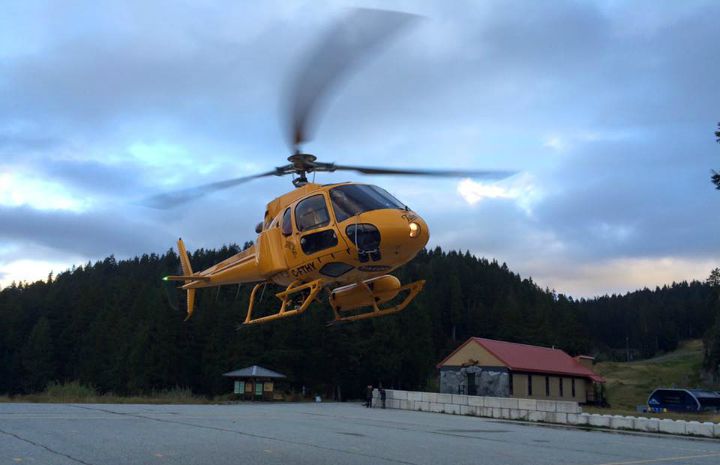It’s no secret this has been a taxing year for British Columbia’s search and rescue (SAR) teams.

But along with the sizeable increase in emergency responses, comes the urgent need for additional funding. Funding the province’s 80 volunteer teams has always been a challenge, and it’s one the B.C. Search and Rescue Association (BCSARA) is hoping to solve.
READ MORE: North Shore Rescue being stretched physically and financially to the limit
For the past two years, BCSARA has been working with the province and other stakeholders on a support model that will provide stable funding for SAR.
“The goal of the model is to increase funding and reduce the administrative and fundraising burden of the 80 SAR groups and their 2,500 members,” BCSARA director Jim McAllister said.
Currently, the province’s volunteer SAR groups get the money to operate their teams from gaming grants, municipalities and through private donations. But all of that takes time, and it’s still not enough.
“The current model works to some degree,” BCSARA vice-president Colin Wiebe told Global News.
“But as we’ve evolved over the 50 to 60 years of search and rescue that our SAR groups have recognized, the administrative burden on them is becoming significant.”
Wiebe believes the new model will help eliminate some of the burden on the SAR groups.
The suggested model is currently being used by several states in the U.S. and includes a SAR fund established in government legislation, where funding flows from several sources that a board would oversee.
The proposal suggests three possible versions of funding ranging from $4 to $9 million.
TABLE: Funding levels required for three versions
| Version 1 | Version 2 | Version 3 | ||
| Training | $ 2,000,000.00 | $ 2,000,000.00 | $ 2,000,000.00 | |
| Licensing and Insurance | $ 400,000.00 | $ 400,000.00 | $ 400,000.00 | |
| Liability Insurance | $ 250,000.00 | $ 250,000.00 | $ 250,000.00 | |
| Personal Protective Equipment | $ 800,000.00 | $ 800,000.00 | $ 800,000.00 | |
| Radio Licensing | $ 75,000.00 | $ 75,000.00 | $ 75,000.00 | |
| Administrative and Coordination | $ 350,000.00 | $ 425,000.00 | $ 550,000.00 | |
| Funding for BCSARA Meetings | $ 75,000.00 | $ 75,000.00 | $ 75,000.00 | |
| SAR Prevention | $ 250,000.00 | $ 250,000.00 | $ 250,000.00 | |
| SAR Response Reviews | $ 35,000.00 | $ 35,000.00 | $ 35,000.00 | |
| Critical Incident Stress Management | $ 50,000.00 | $ 50,000.00 | $ 50,000.00 | |
| Data Collection | $ 75,000.00 | $ 75,000.00 | $ 75,000.00 | |
| Capital replacement | $ 1,300,000.00 | $ 1,300,000.00 | ||
| Building Costs | $ 800,000.00 | $ 800,000.00 | ||
| Response Reimbursement | $ 2,500,000.00 | |||
| Totals | $ 4,360,000.00 | $ 6,535,000.00 | $ 9,160,000.00 | |
| Funding from Local Authorities | $ 2,000,000.00 | $ 2,000,000.00 | $ 2,000,000.00 | |
| Totals | $ 6,360,000.00 | $ 8,535,000.00 | $ 11,160,000.00 | |
According to BCSARA’s research, the new SAR fund model would have the potential to ease demands on ministry budgets and reduce the administrative workload on staff and volunteers with regards to applications for grants.
The idea is that the monies within the SAR Fund would be distributed to SAR teams using a formula, which would be based on the type of response capability (ie. search, swiftwater, rope, avalanche) as well as recognizing the training, equipment and other costs associated with maintaining that service.
A set amount would be provided annually for insurance, training and licensing fees. The cost of emergency responses would be reimbursed after each incident since scale and scope varies in each case.
Where would the money come from?
The proposal offers several ideas around user fees on lift tickets, snowmobile registration, provincial park camping and a surcharge on outdoor equipment. BCSARA said the response to several of these ideas to generate funding was very negative. In addition, the concept of cost recovery as a penalty for emergency response is not supported by the SAR community over fears of getting delayed calls for assistance.
“We don’t believe those are sources,” Wiebe said. “However they’re in the proposal because they are other avenues that other jurisdictions have sought out.”
North Shore Rescue (NSR), a Vancouver-based search and rescue team, has experienced a record number of calls for help this summer, which has continued throughout the fall. And while it’s clear to NSR their resources do not currently match the increased demand, the team released a statement saying they are financially stable and “their reference to the sustainability of SAR activities relates to the human resources of the team. The team has a small number of dedicated members who are available 24/7 and the high number of calls has been personally taxing.”
In their statement NSR said the development of a SAR funding model is a “complex undertaking” and that “the current proposed Alternative Funding Model for Ground and Inland Search and Rescue in British Columbia has outlined many of the challenges of SAR teams in BC. NSR needs to further study and discuss the revised proposal in order to provide appropriate review The proposed model is a one-size-fits-all solution, and may be more suitable for teams with a lower call volume. Any solution to the funding issues must fit the needs of all teams and specifically address those on either end of the scale appropriately.”
The current proposal is being sent to SAR groups around the province for more input before BCSARA presents it to the ministry.




Comments